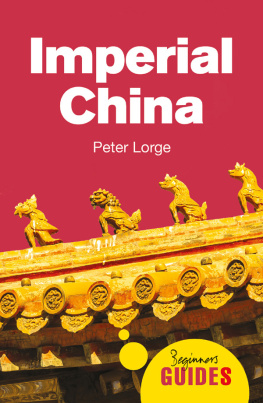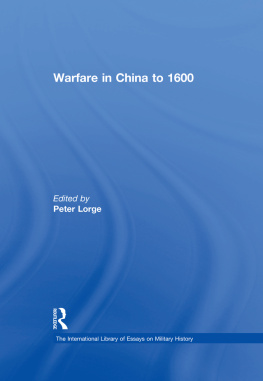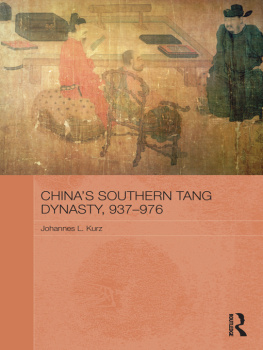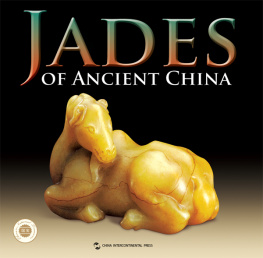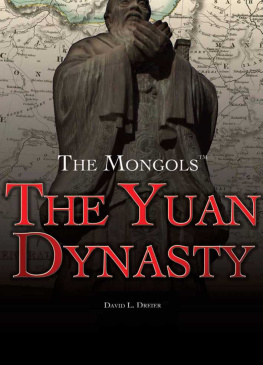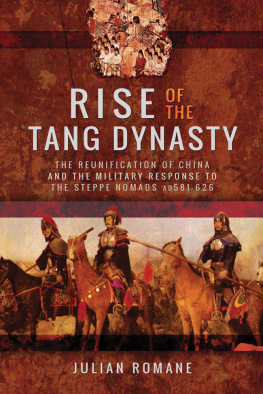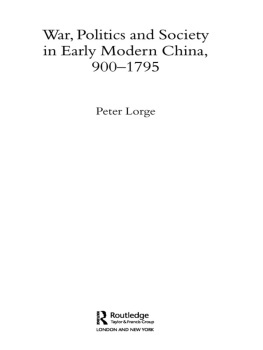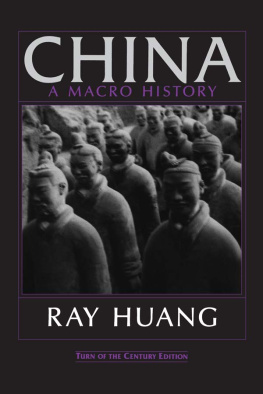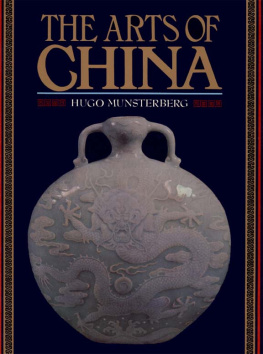Peter Lorge - The Reunification of China: Peace through War under the Song Dynasty
Here you can read online Peter Lorge - The Reunification of China: Peace through War under the Song Dynasty full text of the book (entire story) in english for free. Download pdf and epub, get meaning, cover and reviews about this ebook. year: 2015, publisher: Cambridge University Press, genre: Politics. Description of the work, (preface) as well as reviews are available. Best literature library LitArk.com created for fans of good reading and offers a wide selection of genres:
Romance novel
Science fiction
Adventure
Detective
Science
History
Home and family
Prose
Art
Politics
Computer
Non-fiction
Religion
Business
Children
Humor
Choose a favorite category and find really read worthwhile books. Enjoy immersion in the world of imagination, feel the emotions of the characters or learn something new for yourself, make an fascinating discovery.

- Book:The Reunification of China: Peace through War under the Song Dynasty
- Author:
- Publisher:Cambridge University Press
- Genre:
- Year:2015
- Rating:5 / 5
- Favourites:Add to favourites
- Your mark:
- 100
- 1
- 2
- 3
- 4
- 5
The Reunification of China: Peace through War under the Song Dynasty: summary, description and annotation
We offer to read an annotation, description, summary or preface (depends on what the author of the book "The Reunification of China: Peace through War under the Song Dynasty" wrote himself). If you haven't found the necessary information about the book — write in the comments, we will try to find it.
The Reunification of China: Peace through War under the Song Dynasty — read online for free the complete book (whole text) full work
Below is the text of the book, divided by pages. System saving the place of the last page read, allows you to conveniently read the book "The Reunification of China: Peace through War under the Song Dynasty" online for free, without having to search again every time where you left off. Put a bookmark, and you can go to the page where you finished reading at any time.
Font size:
Interval:
Bookmark:
The Reunification of China
The Song dynasty (9601279) has been characterized by its pre-eminent civil culture and military weakness. This ground-breaking work demonstrates that the civil dominance of the eleventh century was the product of a half century of continuous warfare and ruthless political infighting. The spectacular culture of the eleventh century, one of the high points in Chinese history, was built on the bloody foundation of the conquests of the tenth century. Peter Lorge examines how, rather than a planned and inevitable reunification of the Chinese empire, the foundation of the Song was an uncertain undertaking, dependent upon highly contingent battles, both military and political, whose outcome was always in doubt. Song civil culture grew out of the successful military campaigns that created the dynasty and, as the need for war and armies diminished, the need for civil officials grew. The Song dynastys successful waging of war led ultimately to peace.
Peter Lorge is Assistant Professor of Asian Studies in the Department of History at Vanderbilt University. He is the author of War, Politics and Society in Early Modern China, 9001795 (2005), The Asian Military Revolution: From Gunpowder to the Bomb (Cambridge University Press, 2008), and Chinese Martial Arts: From Antiquity to the Twenty-First Century (Cambridge University Press, 2011). He is also the editor of The Five Dynasties and Ten Kingdoms (2012), Debating War in Chinese History (2013), and the book series Asian States and Empires .
The Reunification of China
Peace through War under the Song Dynasty
Peter Lorge
Vanderbilt University


University Printing House, Cambridge CB2 8BS, United Kingdom
Cambridge University Press is part of the University of Cambridge.
It furthers the Universitys mission by disseminating knowledge in the pursuit of education, learning and research at the highest international levels of excellence.
www.cambridge.org
Information on this title: www.cambridge.org/9781107084759
Peter Lorge 2015
This publication is in copyright. Subject to statutory exception and to the provisions of relevant collective licensing agreements, no reproduction of any part may take place without the written permission of Cambridge University Press.
First published 2015
Printed in the United Kingdom by Clays, St Ives plc
A catalogue record for this publication is available from the British Library
Library of Congress Cataloging-in-Publication Data
Lorge, Peter Allan, 1967
The reunification of China : peace through war under the Song Dynasty / Peter Lorge, Vanderbilt University.
pages cm
Includes bibliographical references and index.
ISBN 978-1-107-08475-9 (Hardback : alk. paper) ISBN 978-1-107-44679-3 (Paperback : alk. paper) 1. ChinaHistorySong dynasty, 960-1279. 2. ChinaHistory, Military960-1644. I. Title.
DS751.L67 2015
951.024dc23 2015016872
ISBN 978-1-107-08475-9 Hardback
ISBN 978-1-107-44679-3 Paperback
Cambridge University Press has no responsibility for the persistence or accuracy of URLs for external or third-party internet websites referred to in this publication, and does not guarantee that any content on such websites is, or will remain, accurate or appropriate.
The research for this book began as a dissertation under the direction of Robert Hartwell. Professor Hartwell passed away before seeing it completed, and this book is respectfully dedicated to his memory.
The other members of my dissertation committee, Nathan Sivin, Paul Smith, and Joanna Waley-Cohen, continued to support me in completing the dissertation and in the years since. To all of them, I am eternally grateful.
I have incurred many other debts in the years that passed since that dissertation was finished. Perhaps the most important was a two-year postdoctoral fellowship at the Institute for History and Philology at Taiwans Academia Sinica. That fellowship was made possible by Professor Huang Kuan-chung, whose support for my work was critical in advancing my research.
Most recently, I have been extremely fortunate in the support staff at Vanderbilt University, Yuh-Fen Benda, one of our extraordinary librarians, and Chris Strasbaugh and his staff at the Visual Resources Center, who helped make my map production even possible. I would also be remiss if I did not thank my extraordinary colleague Ruth Rogaski, who diligently went through the manuscript and offered many critical improvements.
My editors at Cambridge University Press, Dr. Lucy Rhymer and Rosalyn Scott, have been a pleasure to work with and added greatly to the quality of this volume. I must also offer my deepest gratitude to the anonymous readers whose comments went so far in correcting my many errors. That the final product is in any way coherent owes much to their anonymous help. Of course, neither the best editors nor the best readers can find and fix every error that I have made, and what remains is, of course, entirely my own fault.
Finally, I must thank my family. My parents and my siblings for having to listen to the travails of this book for so long, and to my wife, Tracy, and my daughters, Aileen and Lindsay, for my continual distraction. It is now done, and I can start endlessly discussing and being distracted by the next project.
The interaction between war and politics was the most important driving force in the formation of the early Song dynasty. War and politics shaped not just the territorial extent of the empire and the structure of the government, but the character and culture of the dynasty as well. Virtually inseparable sources of power for the first emperor, posthumously known as Song Taizu (r. 960976), these two forces were gradually separated during the reign of the second emperor, posthumously known as Song Taizong (r. 976997), before becoming almost fully detached from each other, at least with respect to the emperors power, in the reign of the third emperor, posthumously known as Song Zhenzong (r. 9971022). Up until now, this process has been simplified into a process of the rise of civil power over military power. There were, however, specific, historical reasons for the shift of political power to government bureaucrats; it did not happen because of a prescriptive imperial plan that intended to emphasize civil values over military values. Ironically, the civil-dominated government that emerged at the beginning of the eleventh century was produced by a half century of war and personal politics.
Civil officials in the late tenth century were given power in the government bureaucracy because they had no power outside of the central government. Initially, the imperial government at Kaifeng itself had very little authority. Military and political power was vested in the person of the emperor, whose authority came from his military success and his personal connections to the generals controlling the central armies. These personal ties allowed Song Taizu to focus the dynastys military power on conquest, rather than infighting, and then, with each military success, on political consolidation. The dynasty gradually became separated from the person of the emperor alone and, because the wars of conquest were successful, the imperial government gained power. Bureaucrats gained power when the central government they served gained power. Simultaneously, military matters, while still maintaining an enormous bureaucratic apparatus in the central government, became border or external concerns. Military men served the court, were paid by the court, and led imperial armies rather than maintaining their own forces from regional strongholds. All of these developments were driven by military success and shaped by political struggles. There was nothing natural or inevitable about the particular direction of early Song dynasty history.
Font size:
Interval:
Bookmark:
Similar books «The Reunification of China: Peace through War under the Song Dynasty»
Look at similar books to The Reunification of China: Peace through War under the Song Dynasty. We have selected literature similar in name and meaning in the hope of providing readers with more options to find new, interesting, not yet read works.
Discussion, reviews of the book The Reunification of China: Peace through War under the Song Dynasty and just readers' own opinions. Leave your comments, write what you think about the work, its meaning or the main characters. Specify what exactly you liked and what you didn't like, and why you think so.

